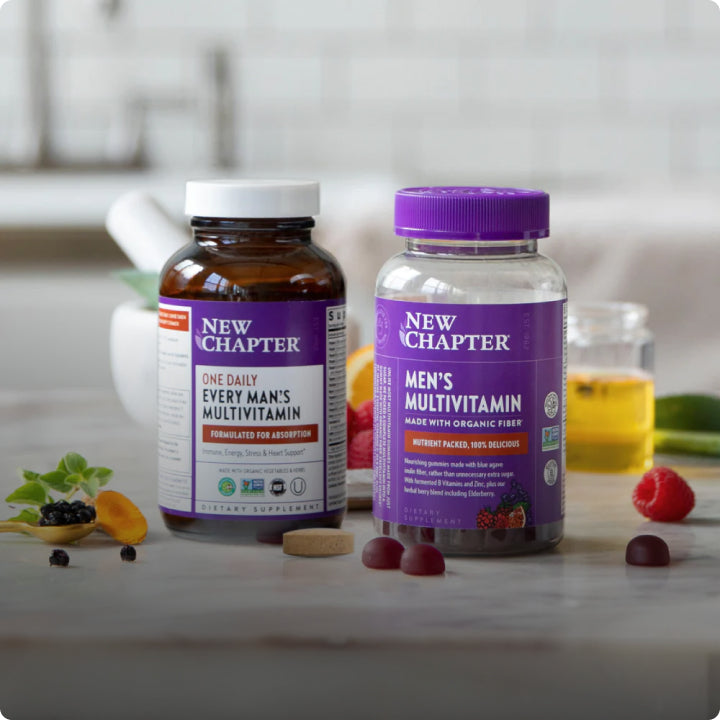Multis are one of the most popular types of dietary supplements. A 2020 consumer survey on supplements showed 98% of supplement users have taken vitamins & minerals in the past year! It’s easy to see the appeal—just take your daily tablet and boom, you’ve covered key areas of nutritional health, no matter how well-balanced (or unbalanced) your diet was that day.
Multivitamins are easy to find, but that can create a problem. Walk into any store that sells multivitamins, and you will quickly become overwhelmed by your selection of options. Not only are there many different brands of multivitamins to consider, but you will also have different formulations within some brands. So, which one is right for you? In this essential guide we’ll be breaking down multivitamins—what they are, how they benefit the body, and how choosing the right one can be so worth it.
What are multivitamins?
A multivitamin is a blend of essential micronutrients that is typically delivered in pill form. Also called “multis” or “vitamins,” multivitamins are dietary supplements formulated to support overall wellness and fulfill nutrient needs. The idea of supplementing health by taking vitamins has only been around for about 100 years, when scientists first started to identify individual micronutrients and connect them to deficiencies in the body.
Today, many Americans take a multivitamin as part of maintaining a healthy lifestyle. People appreciate having a reliable and simple way to get regular nutritional support. Just one or more tablets a day can help provide some of the most essential vitamins and minerals for life. It’s often considered a “nutritional insurance policy” for covering gaps left by a less-than-optimal diet.
What do multivitamins contain?
Multis are blends of science-backed recommended micronutrients, typically including multiple vitamins like A, C, E, and the B’s, and multiple minerals, such as Selenium, Zinc, and Magnesium. Like the name implies, micronutrients are needed only in small amounts, and they can be packed into one or more convenient daily tablets. Some multis are customized for a specific benefit, such as for boosting energy or supporting pregnancy. Some multivitamins also include botanicals, like New Chapter’s line of multivitamins made with organic vegetables and herbs.

Types of Multivitamins
To start finding the right multivitamins for you, it can help to know some of the types of multis out there.
Fermented
Fermented multivitamins are formulated with vitamins and minerals that have been fermented with live probiotics to activate and pre-digest the nutrition for your body to utilize. Fermented multis can be very gentle on the stomach and easy to digest.
Raw
Multivitamins labeled as “raw” are formulated without heating the ingredients above a set temperature, to support those following a raw food eating pattern . It’s believed that not being heated or processed keeps that nutrition intact in the food. (However, some plants have more nutrient density than can be utilized raw, and cooking unlocks these nutrients.)
Whole Food
Multis labeled “whole food” may be derived from whole food (such as Vitamin C that has been extracted from the Amla berry) or may include whole-food ingredients (such as an added immune-support blend that includes Elderberry). New Chapter multivitamins take an additional step, fermenting nutrients with probiotics, whole foods, and the beneficial yeast Saccharomyces cerevisiae to help the body recognize them as food because the yeast has absorbed the vitamins and minerals right into its structure.
Conventional
Conventional multivitamins are blends of just isolated vitamins and minerals that have not been fermented or combined with foods or herbs. Some users find that these multis can cause nausea or digestive upset.

How are fermented multivitamins different?
If you’re taking an unfermented multivitamin, your body may not be getting the most out of the product you’re trusting to fill nutritional gaps. Many multivitamins are made with just synthetic, isolated nutrients that can be hard on the digestive system.
New Chapter multivitamins are different. We formulate for absorption, and this includes fermenting key vitamins, minerals, and herbs to activate and unlock them. Fermentation levels up nutrients so they are more like food and ready for the body to use. Fermented multis are crafted to give you the full value out of every part of your multivitamin.
Benefits of Taking Multivitamins
No matter what your dietary intake, a supplement regimen is meant to build reliable nutritional support into your day and support foundational health. Some targeted health benefits that multivitamins may offer include:
- Support for occasional stress*
- Heart health support*
- Energy support*
- Healthy aging support*
- Immune system support*
- Bone and teeth support*
- Digestive support*
Men’s Multivitamins
Multivitamins targeted for men’s health should provide the broad foundation of vitamins and minerals needed for overall adult health, and include specific nutrients considered essential for men, such as Zinc and Copper. In addition, you can look for multivitamins that deliver complementary herbs for men’s wellness, such as Saw Palmetto and Pumpkin seed.
Women’s Multivitamins
Like men’s multis, multivitamins specifically for women’s health should provide the broad foundation of vitamins and minerals needed for overall adult health, and include specific nutrients considered essential for women. If you are of childbearing age, check the Supplement Facts for Iron and for Folate (folic acid). (Multivitamins for older women typically do not provide Iron as it’s not generally needed during menopause and beyond.) You can also look for multis that deliver complementary herbs and superfoods for women’s health, such as Raspberry leaf and Red Clover flower.
Multivitamins for Healthy Aging
Multis for older adults may deliver enhanced levels of some nutrients, such as B Vitamins, to help support healthy, graceful aging.* Vitamin B12 in particular is recommended for older adults. For adults 55+, multivitamins may be tailored for extra immune benefits, since the immune system can start to slow down with age.
Prenatal Multivitamins
During pregnancy and even before, it’s common for women to support their nutritional needs by taking a daily prenatal vitamin. For example, taken before conception and during pregnancy, Folic Acid (which may be delivered as Folate or Methylfolate) supports healthy development of baby’s brain and spinal cord.* Taking a multi with Iron can transport oxygen to your growing baby during pregnancy.* Be sure to talk to your healthcare provider for advice on prenatal and preconception health.
Children’s Multivitamins
Parents and caregivers who want a little nutritional peace of mind may choose to give children’s multivitamins to their kids (especially picky eaters!). Consumer research shows about 1 in 4 kids takes a multivitamin. Multis for kids have lower levels of nutrients for smaller bodies and may come in gummy or chewable forms. Be sure to talk to your child’s healthcare provider about when to give them supplements. Read labels carefully for ingredient information and warnings (including keeping out of kids’ reach).

4 Things to Consider When Choosing a Multivitamin
So, we know that taking a multivitamin helps support nutrition and delivers foundational health benefits. What exactly should you consider when picking the multi for you? Here are four factors to help you shop smart. You likely want a multivitamin with the right ingredients, dosage, and formulation backed by a company that pursues third-party certifications to ensure that the products are of the highest quality. Here’s how to pinpoint your perfect multi match!
Read the Ingredients
We’ll stress it again: not all multivitamins are created equal. In fact, they may not even contain the same nutrients. To evaluate a supplement’s ingredients, review the Supplement Facts panel on the label to make sure your multivitamin contains the nutrients you expect. These can include:
| Nutrient | Benefit |
| Vitamin A | to support immune and eye health* |
| B Vitamins | for energy support* |
| B1 (Thiamin) | for supporting the metabolism of carbohydrates |
| B2 (Riboflavin) | to support metabolic pathways and energy production |
| B3 (Niacin) | to help nerve function and to help in processing fats and sugars in the body |
| B5 (Pantothenic acid) | for breaking down fatty acids |
| B6 (Pyridoxine) | to support metabolism of amino acids and glycogen |
| B7 (Biotin) | for proper mitochondrial and enzyme function |
| B9 (Folic Acid or Methylfolate — types of Folate) | for the metabolism of amino acids |
| B12 | for nerve and blood cell support* |
| Vitamin D3 | for bone and immune support* |
| Vitamin C and Zinc | to support immune and skin health* |
| Vitamin E | for antioxidants |
| Vitamin K | for healthy blood coagulation* |
| Chromium | to support metabolism* |
| Selenium | for neutralizing excess free radicals and protecting cells from oxidative stress* |
You can also check the form of the ingredients—for example, are they fermented if possible, to help activate them for absorption?
Finally, some multivitamins contain additional ingredients for holistic, whole-body benefits. This may include herbs, vegetables, and other whole foods such as Maca, Elderberry, Ginger, or Turmeric. Every New Chapter multivitamin tablet—except for herb-free options—is designed with herbal blends for complementary benefits from traditional botanicals.
Review the Serving Size
In theory, you should be able to get all the nutrients you need through diet alone. In reality, this does not happen for most Americans. In fact, nearly one-third of the U.S. population is at risk of deficiency in at least one vitamin, according to a 2017 study published in Nutrients.
The right multivitamin is intended to boost nutrition in areas where your food may not be providing enough nutrients. And dosage is a critical factor in how you meet your nutritional needs. First, let’s look at physical serving size in terms of the number of multivitamins you should take. For instance, if you want to ensure you’re getting the necessary nutrients but don’t want to take too many pills, you should look for a one daily multivitamin. Conversely, if you’re more concerned about finding a multivitamin with higher nutrient content, you may consider a two-a-day or three-a-day multivitamin for extra boosts of nutrients. In this case, your dosage depends on your individual needs and preferences.
Next, let’s examine daily values. The Food and Drug Administration (FDA) has set recommended amounts of key nutrients per day. These requirements are known as Daily Values (DVs) and are based on a 2,000-calorie diet for healthy adults. For example, below are some adult DVs for the following nutrients:
| Nutrient | Adult DV |
| Vitamin B12 | 2.4 micrograms (mcg) |
| Vitamin C | 90 milligrams (mg) |
| Vitamin D | 20 mcg |
| Folate | 400 mcg DFE (Dietary Folate Equivalents) |
| Zinc | 11 mg |
| Source: Food & Drug Administration | |
To maintain good health, you should strive to achieve the Daily Values each day, whether from your diet or your multivitamin. To understand how much of a particular nutrient one multivitamin provides, look for the Percent Daily Value (%DV) on the Supplement Facts label. The %DV of a certain nutrient varies based on the multivitamin. Most manufacturers consider the fact that you may get some nutrition from your food, and the multivitamins are formulated to help you achieve the Daily Values or sometimes higher.
Assess Your Health Needs
Next, consider your specific health needs when choosing a multivitamin. These may vary depending on your age, gender, or stage of life. For example, a multivitamin designed for men ages 40 and older may contain higher levels of certain nutrients to support healthy aging.* New Chapter’s Every Man™’s One Daily 40+ Multivitamin is crafted to support heart, vision, and prostate health, and contains herbal ingredients for men like Saw Palmetto and Pumpkin Seed.*
Multivitamins can also be formulated to deliver specific health benefits. For example, someone experiencing occasional stress can benefit from a calming multivitamin that includes B vitamins (for energy), Vitamin C (to support your body’s normal adrenal response) and soothing herbs like Lemon Balm and Chamomile.*
Check for Certifications
Finally, look for third-party credentialing. Don’t just take the manufacturer’s word for it; instead, make sure of certain characteristics by checking for validation by trusted independent entities. Third-party certification can help ensure the multivitamins you choose are clean, pure, and good for you and the planet. There are multiple ways a supplement company can be certified. Here are some to look for:

New Chapter proudly lists our certifications on the front of every product.
Should you take a multivitamin?
The bottom line is that the right multivitamin can deliver an intelligently selected array of the vitamins and minerals your body needs. It supports a firm nutritional foundation whether or not you’re able to eat a well-balanced diet every day. If you’re new to supplements, taking a multivitamin is one of the easiest ways to get key nutrients that your diet may be lacking.
Talk to your healthcare practitioner with any questions you may have, particularly if you are pregnant or planning to be. We invite you to explore our site to learn more about our full line of New Chapter multivitamins. We also share some tricks for remembering to take your vitamins , and simple ways to deal with swallowing pills. Don't love tablets? We also have a full line of multivitamin gummies that are 100% delicious and formulated with NO unnecessary extra sugar. We’re here for you and always testing, fermenting, innovating, and formulating so you can absorb the natural goodness of whatever supplement you choose. That’s wellness, well done!






